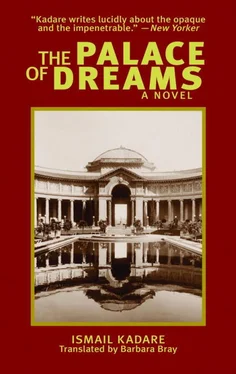“Thank you. Insh’Allah!” said Mark-Alem’s mother.
The two cousins now joined in the conversation. As he listened to them, Mark-Alem remembered the endless discussions the question of his job had given rise to before the Tabir was finally chosen. Any outsider hearing them would have been incredulous. How could there be such earnest arguments over a job for a Quprili, the illustrious family that had given the Empire not only five prime ministers but also countless ministers, admirals, and generals, two of whom had led campaigns in Hungary, another in Poland, while yet another had invaded Austria. Even today, despite its relative eclipse, the Quprili family was still one of the pillars of the Empire, the first to have launched the idea of its reconstruction in the form of the U.O.S. (the United Ottoman States), and the only family that had an entry to itself in the Larousse encyclopedia. It was included there under the letter K. The entry read: KÖPRÜLÜ: great Albanian family which provided the Ottoman Empire with five Grand Viziers between 1666 and 1710. It was on this family’s door, moreover, that the highest functionaries of the State knocked timidly when they sought protection, advancement, or clemency….
But incredible as the business of Mark-Alem’s job might seem to others, in the eyes of those who knew something about the family’s history, it was a different matter. For nearly four hundred years the Quprilis had seemed fated equally to glory and to misfortune. If its chronicles included great dignitaries, secretaries of state, governors, and prime ministers, they also told how just as many members of the family had been imprisoned or decapitated or had simply vanished. “We Quprilis,” as Kurt, the youngest of the three uncles, would say half jestingly, “we’re like people living at the foot of Vesuvius. Just as they are covered with ashes when the volcano erupts, so are we every so often struck down by the Sovereign in whose shadow we live. And just as the others resume their ordinary lives afterward, cultivating the soil that is as fertile as it is dangerous, so we, despite the blows the Sovereign rains on us, go on living in his shade and serving him faithfully.”
Ever since he was a child, Mark-Alem could remember the servants coming and going in the house in the middle of the night; the whispering in the corridors; terrified aunts knocking at the gate. He remembered whole days full of bad news and waiting and anxiety, until calm was restored and people wept placidly over the doomed prisoner in his cell, and life resumed its former course, awaiting a new spell of grandeur or fresh misfortune. For as they said in the Quprili family, either their men were appointed to highest office or else they fell into disgrace. No half measures for them.
“It’s a good thing you at least aren’t a Quprili by name,” Mark-Alem’s mother would say sometimes, not really convinced even herself. He was her only child, and after her husband’s death her only care had been to protect her son from the less desirable aspect of the Quprili destiny. This preoccupation had made her more intelligent, more authoritative, and, astonishingly, more beautiful. For a long time, deep down inside, she had made up her mind that Mark-Alem should not go into government service. But by the time he’d grown up and finished his studies, this decision seemed untenable. The Quprili family brooked no idlers, and he had to be found a job somehow—one that offered the most possibilities for making a career and the least for ending up in prison.
In lengthy family discussions they had considered diplomacy, the army, the court, banking and administration. They’d weighed the pros and cons of all of them, the chances of promotion and dismissal. One possibility would be ruled out because it seemed unsuitable or dangerous; another would be rejected for similar reasons; a third might appear different at first, and quite safe, but on closer examination it would turn out to be more risky than its predecessors. So the discussion would go back to the first suggestion, previously set aside with “Oh, God, anything but that!”—and so on and so forth, until Mark-Alem’s mother, exasperated by all the chopping and changing, finally said: “Let him do what he likes—you can’t escape what is written!”
At that point, just as they were going to let Mark-Alem choose for himself, his second uncle, the Vizier, who so far had not taken part in the discussion, finally gave his opinion. At first blush what he suggested seemed so preposterous that it provoked smiles, but it wasn’t long before the smiles faded and every face took on an expression of stupefaction. The Palace of Dreams? How? Why? Then the idea gradually came to seem quite natural. After all, why not? What was wrong with working in the Tabir Sarrail? Not only was there nothing wrong, but it was in fact a much better job than most of the others, which were strewn with pitfalls. But was there really no danger in this case? Yes, of course there were risks, but they were of dream dangers in a world of dreams—the very world the Ancients used to wish to be transported to when they were in trouble and cried, “Oh, God, let it be only a dream!”
So that was how it came about. Little by little the minister’s idea took root in the mind of Mark-Alem’s mother. How was it they hadn’t thought of it before? she wondered. The Tabir now seemed the only institution capable of ensuring her son’s happiness. It offered unlimited opportunities for making a career, but in her eyes its main advantage lay in its vagueness and impenetrability. Reality split in two there and led swiftly to unreality; and the resulting mistiness seemed to her likely to offer her son the best possible refuge when storms broke.
The others came around to her opinion. What’s more, they thought, if the Vizier had initiated the idea there must be something in it. The Tabir Sarrail had recently been playing a more important role in matters of State. The Quprilis, naturally inclined to regard old and traditional institutions with some irony, had rather underestimated the Palace of Dreams. It was said that some years earlier they had managed to curtail its power, though not to have it closed down altogether. But at present the Sovereign had restored it in all its former authority.
Mark-Alem had learned all this gradually, in the course of the long family debates about the kind of employment that would be best for him. Naturally, the fact that the Quprilis somewhat underestimated the Tabir didn’t mean they didn’t have agents there. If they’d been so heedless as to ignore the place completely, they’d long ago have ceased to be what they were. Nevertheless, absorbed as they appeared to be in other state mechanisms, and confident that they would again succeed in neutralizing what they jokingly called among themselves “that woolly institution,” they had ceased to pay it much attention. Now, however, they seemed to be trying to make up for this negligence.
Although they had their own representatives in the Tabir—and scores of them, at that—you couldn’t, said the Vizier to his sister, rely on them as surely as you could on people of noble blood. He was obviously nervous, and she got the impression that he was more anxious about this matter than he cared to admit. He must have more in mind than he’d revealed to her.
This particular interview had taken place two days before Mark-Alem presented himself at the Tabir Sarrail. But ever since the Vizier first made the suggestion, Mark-Alem’s name had always been linked with that of the Palace of Dreams. They were still being joined together now, and that was why the present conversation was getting on his nerves. He hoped they’d change the subject when they sat down to dinner. Luckily they did so even before. The theme was still the Tabir Sarrail, but not in relation to him. Mark-Alem began to take more interest.
Читать дальше












